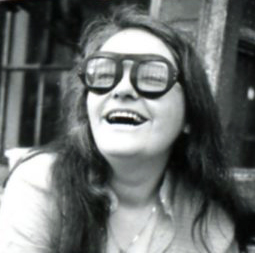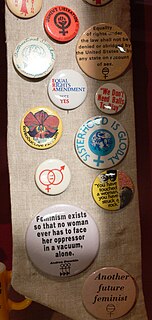Related Research Articles
Feminism is a range of socio-political movements and ideologies that aim to define and establish the political, economic, personal, and social equality of the sexes. Feminism incorporates the position that society prioritizes the male point of view and that women are treated unjustly in these societies. Efforts to change this include fighting against gender stereotypes and establishing educational, professional, and interpersonal opportunities and outcomes for women that are equal to those for men.
Radical feminism is a perspective within feminism that calls for a radical re-ordering of society in which male supremacy is eliminated in all social and economic contexts, while recognizing that women's experiences are also affected by other social divisions such as in race, class, and sexual orientation. The ideology and movement emerged in the 1960s.

Butch and femme are terms used in the lesbian subculture to ascribe or acknowledge a masculine (butch) or feminine (femme) identity with its associated traits, behaviors, styles, self-perception, and so on. The terms were founded in lesbian communities in the twentieth century. This concept has been called a "way to organize sexual relationships and gender and sexual identity". Butch-femme culture is not the sole form of a lesbian dyadic system, as there are many women in butch–butch and femme–femme relationships.

Non-heterosexual is a word for a sexual orientation or sexual identity that is not heterosexual. The term helps define the "concept of what is the norm and how a particular group is different from that norm". Non-heterosexual is used in feminist and gender studies fields as well as general academic literature to help differentiate between sexual identities chosen, prescribed and simply assumed, with varying understanding of implications of those sexual identities. The term is similar to queer, though less politically charged and more clinical; queer generally refers to being non-normative and non-heterosexual. Some view the term as being contentious and pejorative as it "labels people against the perceived norm of heterosexuality, thus reinforcing heteronormativity". Still others say non-heterosexual is the only term useful to maintaining coherence in research and suggest it "highlights a shortcoming in our language around sexual identity"; for instance, its use can enable bisexual erasure.

Katherine Murray Millett was an American feminist writer, educator, artist, and activist. She attended Oxford University and was the first American woman to be awarded a degree with first-class honors after studying at St Hilda's College, Oxford. She has been described as "a seminal influence on second-wave feminism", and is best known for her book Sexual Politics (1970), which was based on her doctoral dissertation at Columbia University. Journalist Liza Featherstone attributes the attainment of previously unimaginable "legal abortion, greater professional equality between the sexes, and a sexual freedom" in part to Millett's efforts.

Lesbian feminism is a cultural movement and critical perspective that encourages women to focus their efforts, attentions, relationships, and activities towards their fellow women rather than men, and often advocates lesbianism as the logical result of feminism. Lesbian feminism was most influential in the 1970s and early 1980s, primarily in North America and Western Europe, and arose out of dissatisfaction with the New Left and the Campaign for Homosexual Equality.

Monique Wittig was a French author, philosopher and feminist theorist who wrote about abolition of the sex-class system and coined the phrase "heterosexual contract". Her seminal work is titled The Straight Mind and other essays. She published her first novel, L'Opoponax, in 1964. Her second novel, Les Guérillères (1969), was a landmark in lesbian feminism.
Feminist separatism is the theory that feminist opposition to patriarchy can be achieved through women's separation from men. Because much of the theorizing is based in lesbian feminism, feminist separatism is often thought of as simply lesbian separatism, but many aspects of the feminist movement utilize and have been influenced by feminist separatism.
Black feminism is a philosophy that centers on the idea that "Black women are inherently valuable, that [Black women's] liberation is a necessity not as an adjunct to somebody else's but because our need as human persons for autonomy."
"Compulsory Heterosexuality and Lesbian Existence" is a 1980 essay by Adrienne Rich, which was also published in her 1986 book Blood, Bread, and Poetry: Selected Prose 1979-1985 as a part of the radical feminism movement of the late '60s, '70s, and '80s.
Political lesbianism is a phenomenon within feminism, primarily second-wave feminism and radical feminism; it includes, but is not limited to, lesbian separatism. Political lesbianism asserts that sexual orientation is a political and feminist choice, and advocates lesbianism as a positive alternative to heterosexuality for women as part of the struggle against sexism.
Sheila Jeffreys is a former professor of political science at the University of Melbourne, born in England. A lesbian feminist scholar, she analyses the history and politics of human sexuality.
The feminist sex wars, also known as the lesbian sex wars, or simply the sex wars or porn wars, are terms used to refer to collective debates amongst feminists regarding a number of issues broadly relating to sexuality and sexual activity. Differences of opinion on matters of sexuality deeply polarized the feminist movement, particularly leading feminist thinkers, in the late 1970s and early 1980s and continue to influence debate amongst feminists to this day.
Feminist sexology is an offshoot of traditional studies of sexology that focuses on the intersectionality of sex and gender in relation to the sexual lives of women. Sexology has a basis in psychoanalysis, specifically Freudian theory, which played a big role in early sexology. This reactionary field of feminist sexology seeks to be inclusive of experiences of sexuality and break down the problematic ideas that have been expressed by sexology in the past. Feminist sexology shares many principles with the overarching field of sexology; in particular, it does not try to prescribe a certain path or "normality" for women's sexuality, but only observe and note the different and varied ways in which women express their sexuality. It is a young field, but one that is growing rapidly.
The Combahee River Collective was a Black feminist lesbian socialist organization active in Boston from 1974 to 1980. The Collective argued that both the white feminist movement and the Civil Rights Movement were not addressing their particular needs as Black women and, more specifically, as Black lesbians. Racism was present in the mainstream feminist movement, while Delaney and Manditch-Prottas argue that much of the Civil Rights Movement had a sexist and homophobic reputation.
Radical lesbianism is a lesbian movement that challenges the status quo of heterosexuality and mainstream feminism. It arose in part because mainstream feminism did not actively include or fight for lesbian rights. The movement was started by lesbian feminist groups in the United States in the 1950s and 1960s. A Canadian movement followed in the 1970s, which added momentum. As it continued to gain popularity, radical lesbianism spread throughout Canada, the United States, and France. The French-based movement, Front des Lesbiennes Radicales, or FLR, organized in 1981 under the name Front des Lesbiennes Radicales. Other movements, such as Radicalesbians, have also stemmed off of the larger radical lesbianism movement. In addition to being associated with social movements, radical lesbianism also offers its own ideology, similar to how feminism functions in both capacities.

Elizabeth Lapovsky Kennedy was one of the founding feminists of the field of women's studies and is a lesbian historian whose book Boots of Leather, Slippers of Gold: A History of the Lesbian Community documents the lesbian community of Buffalo, New York, in the decades before Stonewall.

A variety of movements of feminist ideology have developed over the years. They vary in goals, strategies, and affiliations. They often overlap, and some feminists identify themselves with several branches of feminist thought.
Feminist views on sexuality widely vary. Many feminists, particularly radical feminists, are highly critical of what they see as sexual objectification and sexual exploitation in the media and society. Radical feminists are often opposed to the sex industry, including opposition to prostitution and pornography. Other feminists define themselves as sex-positive feminists and believe that a wide variety of expressions of female sexuality can be empowering to women when they are freely chosen. Some feminists support efforts to reform the sex industry to become less sexist, such as the feminist pornography movement.
Queer of color critique is an intersectional framework, grounded in Black feminism, that challenges the single-issue approach to queer theory by analyzing how power dynamics associated race, class, gender expression, sexuality, ability, culture and nationality influence the lived experiences of individuals and groups that hold one or more of these identities. Incorporating the scholarship and writings of Audre Lorde, Gloria Anzaldúa, Kimberlé Crenshaw, Barbara Smith, Cathy Cohen, Brittney Cooper and Charlene A. Carruthers, the queer of color critique asks: what is queer about queer theory if we are analyzing sexuality as if it is removed from other identities? The queer of color critique expands queer politics and challenges queer activists to move out of a "single oppression framework" and incorporate the work and perspectives of differently marginalized identities into their politics, practices and organizations. The Combahee River Collective Statement clearly articulates the intersecting forces of power: "The most general statement of our politics at the present time would be that we are actively committed to struggling against racial, sexual, heterosexual, and class oppression, and see as our particular task the development of integrated analysis and practice based upon the fact that major systems of oppression are interlocking. The synthesis of these oppressions creates the conditions of our lives." Queer of color critique demands that an intersectional lens be applied queer politics and illustrates the limitations and contradictions of queer theory without it. Exercised by activists, organizers, intellectuals, care workers and community members alike, the queer of color critique imagines and builds a world in which all people can thrive as their most authentic selves- without sacrificing any part of their identity.
References
- 1 2 Myers, JoAnne (2013). Historical Dictionary of the Lesbian and Gay Liberation Movements. Lanham, MD: Scarecrow Press. pp. xl. ISBN 978-0-8108-7226-4.
- 1 2 "Remembering the Vigil: A University Milestone". Duke. 1998-03-31. Retrieved 2022-11-18.
- 1 2 3 "N.C. Schools Employ Radical Lesbian Who Called Marriage 'Slavery' for Women". The Other McCain. 2015-05-25. Retrieved 2022-11-10.
- ↑ Shugar, Dana R. (1995). Separatism and Women's Community. Lincoln: University of Nebraska Press. p. 27. ISBN 978-0-8032-4244-9.
- 1 2 Pohl, Nicole (2001). "Review of Circles otf Power: Shifting Dynamics in a Lesbian-centered Community". Utopian Studies. 12 (2): 301–303. ISSN 1045-991X.
- ↑ Laughlin, Kathleen A.; Castledine, Jacqueline (2011). Breaking the Wave: Women, Their Organizations, and Feminism, 1945-1985. Oxon: Routledge. p. 235. ISBN 978-0-415-87397-0.
- 1 2 Gagehabib, La Verne; Summerhawk, Barbara (2000). Circles of Power: Shifting Dynamics in a Lesbian-centered community. Norwich, VT: New Victoria Publishers. ISBN 1-892281-13-9.
- ↑ Katz, Jonathan Ned (2014). The Invention of Heterosexuality. Chicago: University of Chicago Press. p. 148. ISBN 0-226-42601-7.
- ↑ Young, Stacey (1997). Changing the Wor(l)d: Discourse, Politics, and the Feminist Movement. New York: Psychology Press. p. 176. ISBN 978-0-415-91376-8.
This article needs additional or more specific categories .(November 2022) |